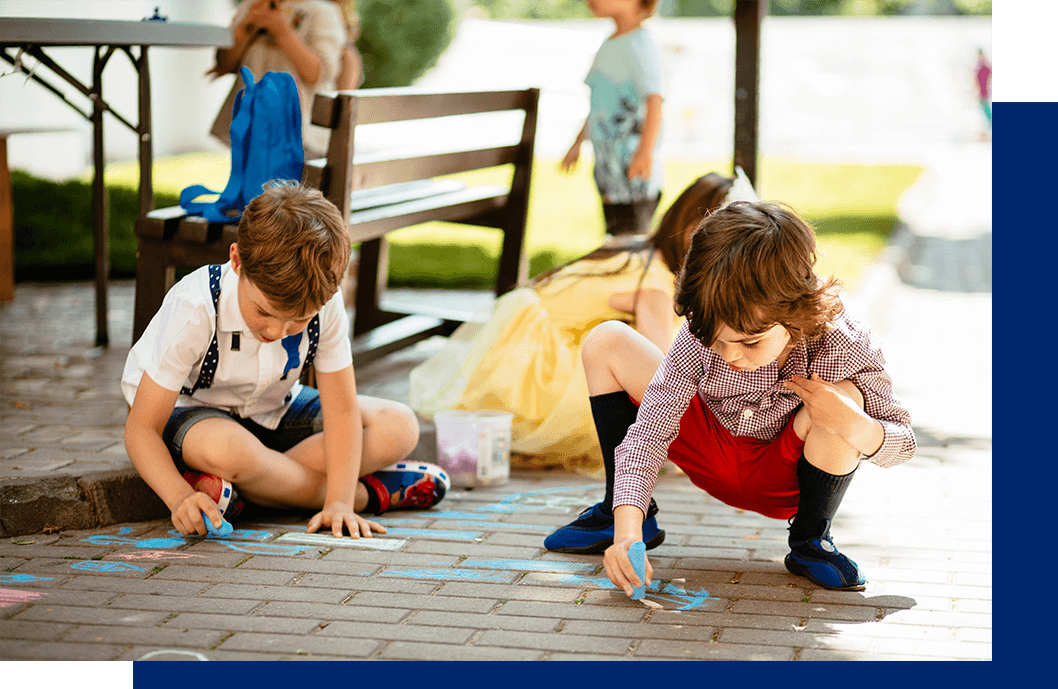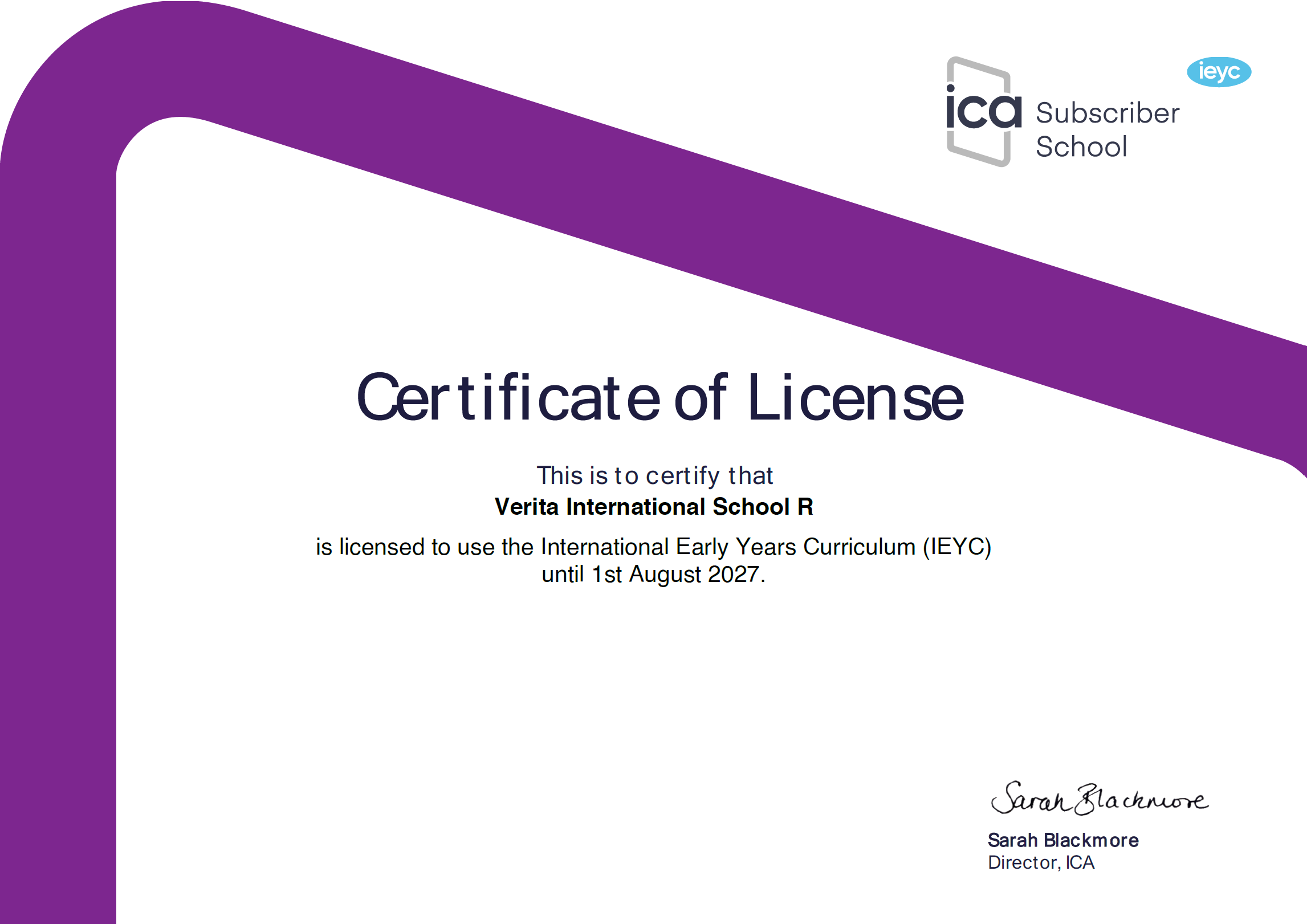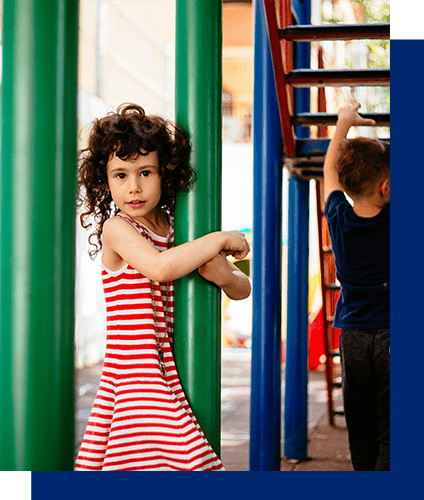Early Years
Foundation Stage Overview
In our school, The Early Years Foundation Stage (EYFS) applies to children from two to five years of age. The final year of the EYFS is referred to as the reception year.
At Verita International School we are committed to underpinning our mission with the four main themes of the Early Years Foundation Stage in our reception classes: A Unique Child, Positive Relationships, Enabling Environments, Academic Learning and Socio-Emotional Development. In the EC and Reception years, the children follow the Early Years Foundation Stage (EYFS) Curriculum of England.
The Unique Child reaches out to relate to people and things through the Characteristics of Effective Learning, which move through all areas of learning: playing and exploring, active learning as well as creating and thinking critically.
Introduction Letter
Roxana Din – Early Years & Y1 Coordinator
Do you remember what job you wanted to have as an adult when you were little? Maybe a ballerina, an astronaut, a policeman, the president or, like myself, a garbage truck driver. Growing up we might have realized that this is not exactly what we wanted, but how many of us gave up on our dreams of any kind just because there was no one there to tell us `Yes, it is possible and I am here for you!` ?
My passion for working in the Early Years comes from my understanding that only by enabling our children to become who they are, we can truly have an impact on the world of tomorrow. Through our exploration of children’s interests…


Introduction Letter
Roxana Din – Early Years & Y1 Coordinator
Do you remember what job you wanted to have as an adult when you were little? Maybe a ballerina, an astronaut, a policeman, the president or, like myself, a garbage truck driver. Growing up we might have realized that this is not exactly what we wanted, but how many of us gave up on our dreams of any kind just because there was no one there to tell us `Yes, it is possible and I am here for you!` ?
My passion for working in the Early Years comes from my understanding that only by enabling our children to become who they are, we can truly have an impact on the world of tomorrow. Through our exploration of children’s interests…
Aims of the
Foundation Stage
In the EYFS setting at Verita International School we believe that all children are entitled to the best possible start in their school life, both intellectually and emotionally, in order to enable them to develop their full potential.
We aim to support each child’s welfare, learning and developmental needs by:
- Recognising that all children are unique and special. Understanding that children develop in individual ways and varying rates- physically, cognitively, linguistically, socially and emotionally.
- Providing a safe, secure and caring environment where children feel happy and know that they are valued by the practitioners looking after them.
- Fostering and nurturing children’s self-confidence and self-esteem through their developing awareness of their own identity and role within the community.
- Teaching children to express and communicate their needs and feelings in appropriate ways.
- Encouraging children’s independence and decision-making, supporting them to learn from their mistakes.
- Developing children’s understanding of social skills and the values and codes of behaviour required for people to work together harmoniously.
- Supporting children to develop care, respect and appreciation of others, including those beliefs, cultures and opinions different to their own.
- Understanding the importance of play in children’s learning and development. Providing learning experiences in play that reflect children’s personal interests and areas of curiosity in order to encourage and develop their natural desire, interest, excitement and motivation to learn.
- Providing experiences which build on children’s existing knowledge and understanding in order to challenge, stimulate and extend their learning and development.
- Offering effective learning opportunities in a range of environments, inside and outside.
EYFS Areas of
Learning and Development
There are seven main areas that teachers and school practitioners focus on to promote children’s development throughout the preschool Years until they reach the Early Years Outcomes.
- PRIME AREAS:
-
- Communication and Language: listening and attention, understanding and speaking.
-
- Physical Development: moving and handling, health and self-care.
-
- Personal. Social and Emotional Development: self-confidence, self-awareness, managing feelings, behaviour, relationships.
- SPECIFIC AREAS:
-
- Phonics, Reading, Writing and Literacy. Pre-reading skills like phonics and phonemic awareness are taught through the Department of Education and Skills primary national strategy called ‘Letters and Sounds.’ Students learn how language works and lay the foundation for their future literacy skills.
-
- Mathematics: Numbers, shapes, space and measures. In EC programmes, Maths is integrated into play. However, our reception classes follow the White Rose programme, an effective scheme of work which allows pupils to make progress through use of concrete objects, varied fluency and hands on experiences. Please click the link below to find out more about White Rose: https://whiterosemaths.com/
-
- Understanding of the World: people and communities, the world and technology.
-
- Expressive Arts and Design: Exploring the use of media and materials, being imaginative.
All these areas are interconnected, reflecting the child centred learning and the integrated teaching approach that our school promotes.

IEYC: International
Early Years Curriculum
The IEYC is an innovative research-based program, recognising global best-practice and the developmental needs of 2.6-5 year olds. It supports key areas of learning through holistic inquiry and play-based approaches encompassing all curriculum areas including personal, social and emotional development.
International Early Years Curriculum (IEYC) is taught in EC-Reception. All students participate in the child centred thematic units on a variety of topics.
The curriculum contains themed Units of Learning. These are sequenced through the IEYC Process of Learning. This captures children’s natural curiosity as a starting point and, within an enabling environment, balances child-initiated and teacher-scaffolded provision.
Each child will have their own unique learning journey through the IEYC. How children learn and develop will depend on the IEYC Units of Learning that are implemented, and learning that is driven through the children’s own interests
For more information about the IEYC, please visit their website here: https://fieldworkeducation.com/curriculums/early-years
Here is our programme of inquiry that outlines all of our IEYC units in the Early Years Foundation Stage:
| UNIT 1 | UNIT 2 | UNIT 3 | UNIT 4 | UNIT 5 | UNIT 6 |
| Reception Theme: Me and My World Unit: This is Me |
Reception Theme: Stories and Storytelling Unit: Once Upon a Time |
Reception Theme: Dinosaurs Unit: Dinosaur detectives |
Reception Theme: Supporting Natural Inquiry Unit: Loose Parts |
Reception Theme: Mini Beasts Unit: The Brilliant Bug Ball |
Reception Theme: Super Heroes Unit: To the Rescue! |
| EC3 Theme: Me and My World Unit: This is Me |
EC3 Theme: Stories and Storytelling Unit: Once Upon a Time |
EC3 Theme: Weather Wonders Unit: The Weather |
EC3 Theme: Supporting independence and healthy Leaving Unit: Mindful Play |
EC3 Theme: Famous Artists Unit: Imagine That |
EC3 Theme: Beach and Sea Life Unit: Ocean Treasures |
| EC2/3 Theme: Me and My World Unit: This is Me |
EC2/3 Theme: Exploring our Environment Unit: The World Around Us |
EC2/3 Theme: Famous Artists Unit: Imagine That |
EC2/3 Theme: Stories and Storytelling Unit: Once Upon a Time |
| UNIT 1 |
| Reception Theme: Me and My World Unit: This is Me |
| EC3 Theme: Me and My World Unit: This is Me |
| EC2/3 Theme: Me and My World Unit: This is Me |
| UNIT 2 |
| Reception Theme: Stories and Storytelling Unit: Once Upon A Time |
| EC3 Theme: Stories and Storytelling Unit: Once Upon A Time |
| EC2/3 Theme: Exploring our Environment Unit: The World Around Us |
| UNIT 3 |
| Reception Theme: Dinosaurs Unit: Dinosaur detectives |
| EC3 Theme: Weather Wonders Unit: The Weather |
| EC2/3 Theme: Famous Artists Unit: Imagine That |
| UNIT 4 |
| Reception Theme: Supporting Natural Inquiry Unit: Loose Parts |
| EC3 Theme: Supporting independence and healthy living Unit: Mindful Play |
| EC2/3 Theme: Stories and Storytelling Unit: Once Upon a Time |
| UNIT 5 |
| Reception Theme: Mini Beasts Unit: The Brilliant Bug Ball |
| EC3 Theme: Famous Artists Unit: Imagine That |
| Unit 6 |
| Reception Theme: Super Heroes Unit: To the Rescue! |
| EC3 Theme: Beach and Sea Life Unit: Ocean Treasures |

Active Learning
through Play
At Verita International School we recognise that young children learn best through being active. We understand that active learning involves other people, objects, ideas and events that engage and involve the children for sustained periods. Therefore, we believe that Early Years education should be as practical as possible and our EYFS has an ethos of learning through play. We recognise the importance of children’s play. It is an essential and rich part of their learning process, supporting them in all areas of development. Play is a powerful motivator, encouraging children to be creative and to develop their ideas, understanding and language.
The EYFS at Verita International School provides both structured and unstructured play opportunities both inside and outside. These activities are designed to engage children in practical, first-hand experiences which supports children to discover, explore, investigate and help to make sense of the world around them.
In providing these active learning opportunities through play we understand the central position of play within the EYFS framework. This is essentially a play-based curriculum and pedagogy as the provision of play opportunities underpins its delivery within our setting.

Ready to embark on the
educational journey of a lifetime?
A passion for travel. A strong academic record. And the desire to improve the world as you experience it. If this sounds like you, you just might be our ideal candidate! Start your application with a five-minute inquiry form – you never know where you might end up.





